Growing Hops In Winter: Information On Hops Winter Care
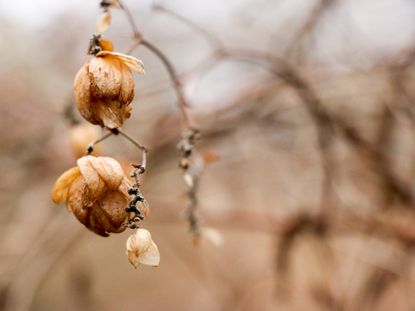

If you're a beer lover, you know the importance of hops. Home beer brewers need a ready supply of the perennial vine, but it also makes an attractive trellis or arbor covering. Hops grow from a perennial crown and cuttings are made from the bines or shoots. Hops plants are hardy in USDA growing zones 3 to 8. Keeping the crown alive during the cold months requires a little protection.
Winterizing hops plants is easy and fast but the small effort will protect the roots and crown and ensure new sprouts in spring. Once you understand how to winter over hop plants, these attractive and useful vines can be yours to use and enjoy season after season.
Hops Plants Over Winter
Once temperatures get below freezing, hops plant leaves fall off and the vine dies back. In temperate zones, the roots and crown rarely receive a lethal freeze, but it's best to be safe and protect the growth zone during the cold season. This is especially important where freezes are sustained and the winter is long.
With proper preparation, growing hops in winter are hardy to minus -20 F. (-20 C.) and will regrow in spring. The new sprouts in spring are very sensitive to frost, however, and can be killed if frozen overnight. Therefore, hops winter care should extend into spring in case of late cold snaps.
How to Winter Over Hop Plants
Hops have a taproot that can extend 15 feet (4.5 m.) into the ground. This part of the plant isn't threatened by cold weather, but the peripheral feeder roots and crown of the vine can be killed. The top roots are only 8 to 12 inches (20.5 to 30.5 cm.) below the surface of the soil.
A heavy layer of organic mulch at least 5 inches (13 cm.) thick helps protect the roots from freezes. You can also simply use a plastic tarp for winterizing hops plants when the greenery has died back.
Before you mulch, cut the vines back to the crown. Wait until the first frost when you see the leaves dropping off so the plant can gather solar energy as long as possible to store in the roots for the next season. The vines tend to sprout easily, so don't leave them to compost on the ground.
Gardening tips, videos, info and more delivered right to your inbox!
Sign up for the Gardening Know How newsletter today and receive a free download of our most popular eBook "How to Grow Delicious Tomatoes."
If you want to start another generation of hops, place cut stems around the base of the plant and then cover them with the mulch. Pull away the mulch when all danger of frost has passed. Not much activity is happening to grow hops in winter, as the plant is dormant. This easy method will help your hops plants overwinter and produce a delicious homebrew.

Bonnie Grant is a professional landscaper with a Certification in Urban Gardening. She has been gardening and writing for 15 years. A former professional chef, she has a passion for edible landscaping.
-
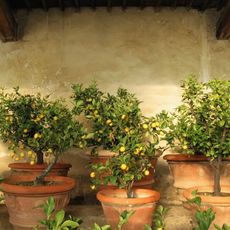 Want a Backyard Mini Orchard? Create Your Own Container Orchard
Want a Backyard Mini Orchard? Create Your Own Container OrchardEasier to care for in small spaces, a backyard mini-orchard makes sense for busy gardeners and juicy fruit is the reward.
By Teo Spengler
-
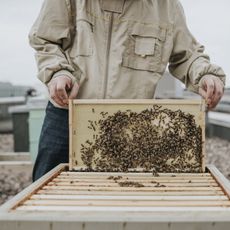 Urban Beekeeping Guide: Top Tips For Raising Bees In The City
Urban Beekeeping Guide: Top Tips For Raising Bees In The CityUrban beekeeping can be a rewarding and appreciated pastime, but first be sure it’s legal in your city and learn the ropes of beekeeping.
By Mary Ellen Ellis
-
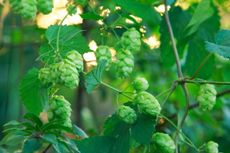 Hops Plant Pruning: When And How To Prune A Hops Plant
Hops Plant Pruning: When And How To Prune A Hops PlantIf you're a home brewer, there's nothing more satisfying than growing your own hops. But hops are long, fast growing vines that require some strategic pruning to get the most out of them. Learn more about how to prune a hops plant in this article.
By Liz Baessler
-
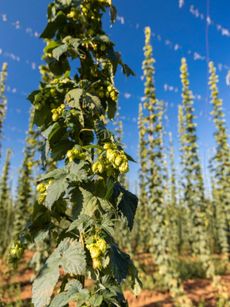 Hops Companion Plants: Learn What To Plant With Hops In Gardens
Hops Companion Plants: Learn What To Plant With Hops In GardensCompanion planting with hops can enhance crop growth and provide a decoy for pesky critters. That said, hop vines are aggressive growers so companion plants need to be considered carefully. This article can help with that.
By Bonnie L. Grant
-
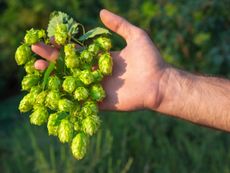 Harvesting Hops Plants: When Is Hops Harvest Season
Harvesting Hops Plants: When Is Hops Harvest SeasonAre you a home brewer? If you have some extra space in your garden, consider growing your own hops to make your beer even more personal.
By Liz Baessler
-
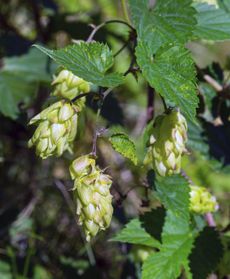 Hops Plant Fertilizer: How And When To Feed Hops Plants
Hops Plant Fertilizer: How And When To Feed Hops PlantsHops can grow up to a whopping 30 feet (9 m.) in a year! To attain this amazing size, it isn't any wonder that they like to be fed every so often. What are hops fertilizer requirements? The following article contains a sort of hops fertilizer guide to help.
By Amy Grant
-
 Hops Spacing Requirements – Tips On Plant Spacing For Hops
Hops Spacing Requirements – Tips On Plant Spacing For HopsMost people know that hops are used to make beer, but did you know that the hop plant is a fast-climbing vine? If you decide to grow hops, give a thought to hops plant spacing. This article has more information on spacing requirements for hops.
By Teo Spengler
-
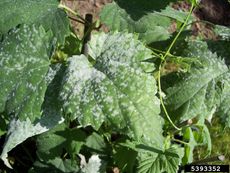 Hops Plant Diseases: Treating Diseases Affecting Hops Plants In Gardens
Hops Plant Diseases: Treating Diseases Affecting Hops Plants In GardensAs prolific as hops can be, the plant may still be afflicted with hops plant diseases. For a fruitful crop, it's important to learn about diseases affecting hops in order to treat hops plant problems ASAP. This article should help with that.
By Amy Grant
-
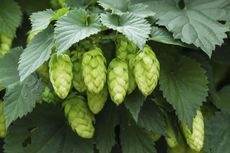 Reasons For No Cones On Hops: How To Get Cones On Hops Plants
Reasons For No Cones On Hops: How To Get Cones On Hops PlantsHops with no cones may be due to the time of the year, cultivation practices, or the age of the vines. Professional growers know how to get cones on hops plants and you can too with a little advice and some tips from the trade. This article will help.
By Bonnie L. Grant
-
 Support For Hops Vines: Learn About Hops Plant Support
Support For Hops Vines: Learn About Hops Plant SupportHops can grow up to 12 inches (30.5 cm.) a day. These rampant climbers need a sturdy trellis of appropriate height to accommodate their size. The following article contains information on the best support for hops plants and building a trellis for hops.
By Amy Grant